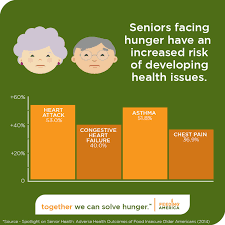In a previous post, we looked into what consists of proper nutrition as we age, and that is connected to this topic; but if you don't have access to food, or you cannot make food for yourself anymore, nutrition becomes a moot point.
In today's society, a pressing yet often overlooked issue is the prevalence of senior hunger. This growing challenge affects a significant portion of our aging population, bringing to light the complexities of food insecurity among the elderly.
The Hidden Reality of Elderly Nutrition Struggles
We will look into the heart of this issue, and it's crucial to understand that senior hunger is not just about the lack of food. It's a multifaceted problem involving nutritional challenges, access to healthy meals, and the ability to prepare food. Many seniors, due to health conditions or financial constraints, find it increasingly difficult to maintain a balanced diet.
The Health Impacts of Food Insecurity in Seniors
The consequences of inadequate nutrition in seniors are profound. It leads to a deterioration in health, exacerbating chronic diseases, and reducing the quality of life. Poor nutrition can also accelerate cognitive decline, making seniors more vulnerable to other health risks.
Poverty and Social Isolation: Key Factors in Senior Hunger

Two critical factors contributing to senior hunger are poverty and social isolation. Many elderly individuals live on fixed incomes, making it challenging to afford nutritious food. Additionally, social isolation, whether due to mobility issues or lack of family support, further restricts their access to proper meals.
Community Support and Meal Assistance Programs
Addressing senior hunger requires a community-centric approach. Meal assistance programs, like Meals on Wheels, play a vital role in providing nutritious meals to seniors in need. These programs also offer a social connection, helping to combat the loneliness that often accompanies aging.
The Role of Policy and Awareness in Combating Elderly Food Insecurity
To effectively tackle senior hunger, it's essential to raise awareness and advocate for policies that support food assistance programs and address the root causes of poverty among the elderly. Community organizations, healthcare providers, and policymakers must work together to create sustainable solutions.
A Call to Action
Senior hunger is a growing concern that demands our attention and action. By understanding the issue, supporting community programs, and advocating for policy changes, we can make a significant difference in the lives of our elderly population. It's not just about providing food; it's about nurturing the health and well-being of a generation that has contributed so much to our society.
Resources:








No comments:
Post a Comment